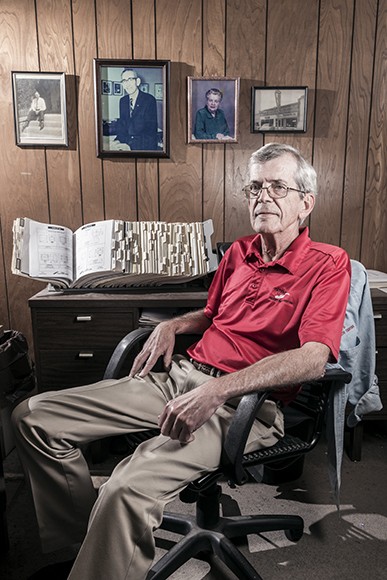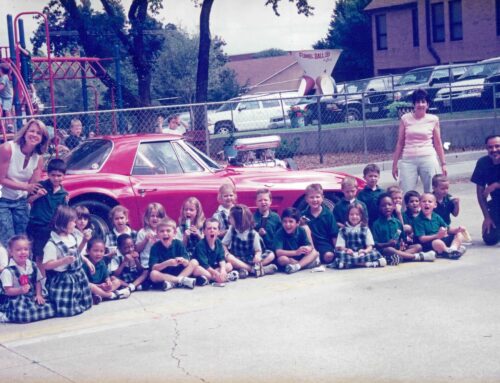After years of running his family’s plumbing parts business, Jack Teter sits on lots of memories and a valuable piece of Lakewood

Jack Teter sits in his office, a space carved out of the old Lakewood Lanes bowling alley. Behind him are photos of family who were influential in the construction and maintenance of Teter’s Faucet Parts, which started in 1947 as Teter’s Plumbing with a Lakewood storefront. (Photo by Danny Fulgencio)
Every few minutes, a bell dings customers into the side door of a nondescript white brick building on Oram near Gaston.
“Teter’s Faucet Parts,” the bright blue sign reads, “Serving the Dallas metroplex since 1935.”
No one walks in to browse. Teter’s is a specialty shop in the true sense of the word: The customers, mostly plumbers, hunt for obscure gaskets and splines to fix broken toilets and kitchen sinks. Larger clients — hotels, apartment complexes, office buildings — just call in their orders.
The showroom’s far wall has a colorful display of replacement toilet seats; on the opposite wall are display boards of showerheads and drain plugs. A few shelves stock items for regular customers who know what they’re after. Most people, however, head straight for the line leading to the main counter. They need the help of an expert.
And in the world of plumbing parts, Jack Teter is one of the foremost experts.
Now 69, he still works behind the counter from 7:30 a.m.-5 p.m. on weekdays. He’s not the only one there; demand is high enough that a handful of employees field phone calls and customer questions. But when they’re stumped, they defer to the boss.
“Do you happen to know how old the faucet is?” Teter asks a customer as he thumbs through a thick catalog.
“About 14 years?” says a man standing at the counter. “It was something my wife special-ordered from a catalog.”
Clearly irritated, the man doesn’t want to spend another minute searching for this needle-in-the-haystack plumbing part to fix a chichi faucet.
Turns out he doesn’t have to. Within seconds, Teter’s pointer finger stops on one of the catalog pages.
“Lookie here,” he says. “Bingo.”
In Lakewood’s hot commercial real estate market, the presence of such a business is as rare as the parts Teter’s sells. The company’s history in the shopping center dates to 1947, when the original Teter Plumbing Co. opened on Abrams in half of the space Curiosities now occupies. It was part of the service industry that dominated the Lakewood Shopping Center’s commercial fabric for decades.
That storefront opened a year after Jack Teter was born. His uncle started the business in 1935, then taught the trade to his nephew, Teter’s father, who passed it on to his son.
Teter remembers a fateful conversation with his father on July 4, 1980. He was visiting from his home in Houston, where he worked as an accountant, and the father confided in the son.
“You know, I’m getting tired of this,” Maurice Teter said of running the store. “I’m going to quit buying and sell until the end of the year.”
That conversation weighed on Teter as he and his sleeping wife drove home.
“I didn’t want to be an accountant,” he recalls thinking.
When she awoke, Teter told her his plan: “I bet if I told him I’d move to Dallas and take over the business, he’d let me.”
By that time, the Abrams storefront was no longer a plumbing shop; it had morphed into solely a faucet parts store. The business transformation in the late ’60s “just came at us,” Jack Teter says.
His father began stocking parts he frequently needed for repairs, and a faucet parts salesman who worked on commission for an out-of-town company began buying from him when he needed parts quickly.
One day, the salesman told Maurice Teter his plumbing shop stocked most everything he sold, and he offered to start working for Teter instead.
“Five years of that, and he gave the plumbing company to the plumbers,” Jack Teter says. “Daddy said the hardest thing he ever did was take his tools off the truck.”
The business eventually grew large enough to take over another storefront in the Lakewood Shopping Center, doubling its space. By the early ’90s,
Teter’s was again running out of room.
Around that time, neighborhood businessmen John Allegro and Bob Burns began working on Teter to buy a 13,000-square-foot building they owned around the corner. Built in the early 1940s as Lakewood Lanes, it was one of many bowling alleys dotting Dallas communities in the mid-century.
After the bowling heyday ended, Lakewood Lanes closed, and for a time the building became a switching station for Southwestern Bell before sitting vacant for years.
“Teter, you gotta buy that old bowling building,” he remembers Allegro and Burns pressuring him. They finally convinced him to take a look inside, and “they wouldn’t let me out” until he agreed to purchase it, he says.
“I had no cash; I made them sign the note for the whole thing,” Teter says. “They wanted out. They weren’t really doing me a favor.”
Teter moved over the weekend, cutting through a fence in the alley and carrying faucet parts bin by bin. With more room to stock more supplies, business boomed, and Teter watched four competitors within 20 miles close their doors.
Two decades later, local commercial real estate experts believe the building could be worth $6 million, but Teter says he isn’t interested in selling.
Yet.
The shopping center housing Teter’s has undergone countless transformations during the course of his lifetime.
Teter recalls when Gene Street opened the Dixie House across the street in 1975, a few years before Teter took over the family business. He was a regular until it closed in January.
But he’s not sad Dixie House is gone. And he won’t be sad when the buyers chomping at the bit to purchase his property finally get their way.
“I don’t really belong here,” Teter says. “This should be retail.”
Such an off-handed remark may sound surprising coming from someone who was born and reared here. Teter is a Woodrow Wilson High School alumnus, whose father and brothers also are alumni. He’s a life member of the East Dallas Exchange Club.
He’s the definition of a Lakewood legacy.
But he won’t be mourning the day his family name is erased from the neighborhood’s commercial landscape.
“It’s just business,” Teter says matter-of-factly.
Offers are made on his property all the time, Teter says. At some point, there will be an offer he can’t refuse, though he didn’t say what it would take.
Once he retires, though, his family’s business won’t stay in the family, and it won’t stay in the neighborhood. Teter’s two apprentices behind the storefront counter live in Wylie and Rockwall, and he imagines the business will move in one of those directions.
As long as he’s at the helm, though, Teter’s will remain in Lakewood.
“That’s my home,” he says, gesturing toward his house on Nonesuch, “and that’s my club,” he says, toward the Lakewood Country Club.
In other words, there may not be a dollar figure large enough to persuade Teter to give up the five-minute radius in which his universe exists until he’s had enough of the plumbing parts business.
And until that day comes, he’s not worried about staying in business, either.
“Home Depot can’t do the specialty stuff,” Teter says. “If you want Mrs. Baird’s, they’ve got it. If you want German pumpernickel, come to us.”
Though Teter’s isn’t the only faucet parts company around, “we’re a good, sound, solid business with a great reputation and great credit. We’re well-known industry-wide,” he says.
“We’re a little high, but we’re the best.”





